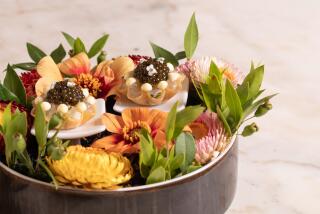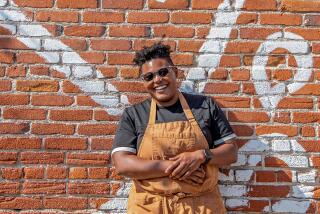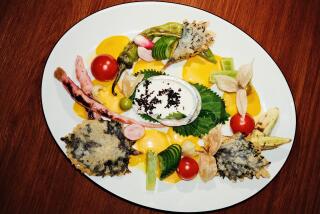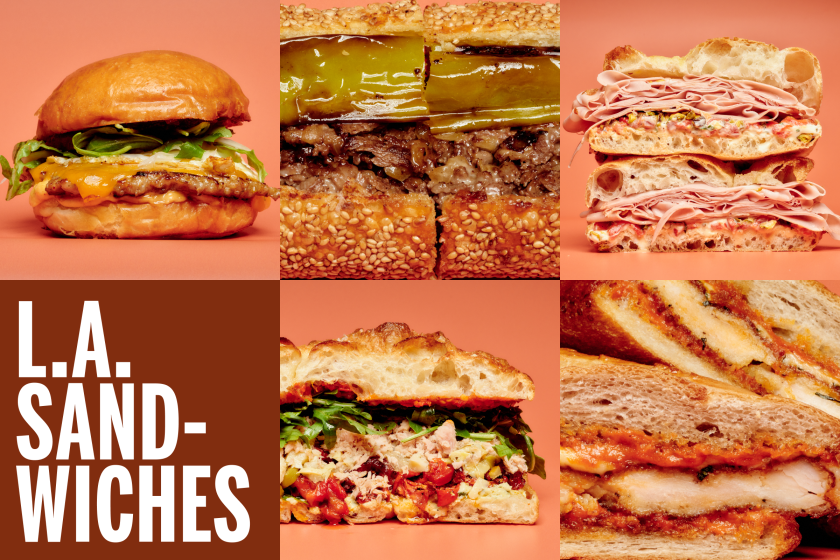Demonstration Cooking Classes Popular in Paris
The soaring price of a fine dinner in Paris is giving tourists second thoughts about plunging into a restaurant that boasts one or more Michelin stars. But there is an affordable way to sample top-level cuisine in Paris: Take a cooking class.
Three top Parisian cooking schools offer demonstration classes in English with tastings of the results, printed recipes to take home and the chance to watch a professional chef in action.
La Varenne, Le Cordon Bleu and the newest school, the Ecole de Gastronomie Francaise Ritz-Escoffier, all have such one-session demonstration classes for about $35.
“It’s a wonderful way to spend an afternoon,” said one student from California who attended the Ritz school. “It gives you as much a feeling of Paris as going to the Eiffel Tower.”
School Opened Last Year
Gregory Usher, director of the new Ritz Hotel school, headed La Varenne school for several years and directed the Paris Cordon Bleu until he was asked to open and head the Ritz school last year.
An American, Usher has lived in Paris since 1970, cooking in four Paris restaurants, teaching, consulting and helping to write a Cordon Bleu cookbook. He came to Paris during his junior year of college to study art history and was won over to French food.
“I knew at once this was the place for me,” he said. “During my first year in Paris I ate at 85 different restaurants, and I’ve continued to seek out fine cooking wherever I go.”
Students in longer-term classes at the Ritz school come to Paris from all over the world. The average student is in her early 30s (two-thirds are women) and has done a “fair amount of cooking,” Usher says. About a third are Japanese, a fifth are American, and the rest are mostly European, though there are many Latin-Americans and a few Australians.
“Some want to further their professional expertise. Some want the polish and finesse that a school like the Ritz can give them,” Usher says. “The important thing for all the students is to be in France, which will always be the important place for food.”
What is different about the new school?
“First of all, it is the Ritz itself and the atmosphere of one of the finest hotels in the world,” Usher says. “And next, there are all the special facilities that are part of the hotel.” Usher says the school is the first private, non-residential institution to offer a complete program in French gastronomy, from bread-baking and pastry making to table service and floral decorations. (There are some things the Ritz will not teach, however: “We don’t do ice sculpture,” says Usher. “It has nothing to do with food.”)
More Than a Kitchen
The classroom is more than a teaching kitchen: It is the hotel’s two-star restaurant. “Students have access to the same cooks, bakers and wine stewards that serve the guests of the hotel,” Usher says. The food for students is served on the hotel’s china, using the Ritz silver service and linens. Ingredients used in the classes are provided by the same sources that supply the hotel. French, naturally, is the first language of the classrooms.
Individuals who want to observe a professional chef at work or watch the preparation of a special dish may attend one of the three-hour demonstration classes.
For more serious students, the school offers one- to 12-week courses in cooking theory, baking, wine, bread and cheese. There’s an eight-week course in pastry, chocolate, ice cream and holiday cakes.
Advanced cooking and pastry is featured in the 12-week Ritz-Escoffier diploma course. Students here are offered internships in the hotel kitchen upon completion of the course.
Courses are flexible, and classes are geared to many interest levels, Usher says. All are non-residential. Cooking courses in other languages, such as Japanese or Spanish, can be arranged.
The school’s three-week Ritz Entertaining Course includes classes in cooking and pastry-making, menu planning, wine selection and floral arranging. The fee is about $750.
No Learning From Mistakes
The students (no more than 12 per class) do all the cooking, “but Christian watches them like a hawk,” says Usher. “They don’t learn by mistakes; they learn by tasting things that have been correctly done.” Christian is Christian Guillut, chef of the Ecole, who was apprenticed 20 years ago as a teen-ager at the restaurant Barrier in Tours when it had three Michelin stars. He has worked in starred establishments ever since.
“Our philosophy is contemporary. Our program is a living program. There are no museum pieces here,” says Usher. When he was at another Paris cooking school, “they were doing set pieces that have completely disappeared from the French cooking repertoire--those old-fashioned dishes with heavy sauces.”
Usher garnishes the courses with visits to the shops of French bakers, chocolate makers and cheese agers as well as to Rungis, the famous wholesale food market serving Paris.
More to Read
Eat your way across L.A.
Get our weekly Tasting Notes newsletter for reviews, news and more.
You may occasionally receive promotional content from the Los Angeles Times.










